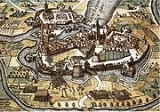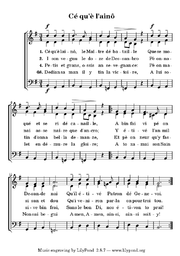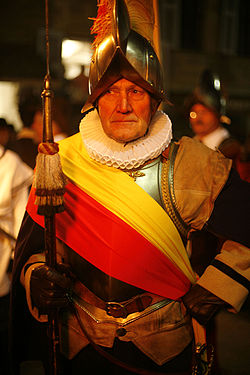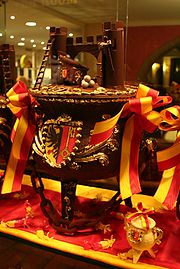
L'Escalade
Encyclopedia
L'Escalade, or Fête de l'Escalade (from escalade
, the act of scaling defensive walls) is an annual festival held in December in Geneva
, Switzerland
, celebrating the defeat of the surprise attack by troops sent by Charles Emmanuel I, Duke of Savoy
during the night of 11–12 December 1602. The celebrations and other commemorative activities are usually held on 12 December or the closest weekend.
. When Charles Emmanuel came to the throne of the House of Savoy
in 1580, he longed to make Geneva his capital north of the Alps and crush Protestantism. Pope Clement VIII
offered encouragement; in 1602 he appointed as Catholic bishop of Geneva Francis de Sales
, an effective preacher who had recently been successful in re-Catholicizing the Chablais
district of Savoy
on the south side of Lake Geneva.
 On December 11 and December 12 (Old Style) 1602 — the longest night of the year
On December 11 and December 12 (Old Style) 1602 — the longest night of the year
— the forces of the Duke of Savoy, under the command of the seigneur d'Albigny, and those of Charles Emmanuel's brother-in-law, Philip III of Spain
, launched an attack on the city-state of Geneva. The troops marched along the Arve River at night and assembled at Plainpalais, just outside the walls of Geneva, at 2 o'clock in the morning. The original plan was to send in a group of commandos to open the gate door and let the other troops in. The Geneva citizens defeated the men by preventing them from scaling the wall (a climb in French
is an escalade). The night guard Isaac Mercier raised the alarm, church bells were rung, and the Genevois were alerted. The populace fought alongside their town militia. The duke's 2000-plus mercenaries were beaten. The Genevois lost 18 men in the fighting; the Savoyards suffered 54 fatalities and the troops had to retreat. Thirteen invaders who had been taken prisoner, including several well-born gentlemen, were summarily hanged the following day as thieves, since they could not be treated as prisoners of war, peace having been repeatedly sworn on the part of Savoy.
According to Genevois legend, Catherine Cheynel, originally from Lyons and the wife of Pierre Royaume, ("Mère Royaume"), a mother of 14 children, seized a large cauldron of hot soup and poured it on the attackers. The Royaume family lived just above the La Monnaie town gate. The heavy cauldron of boiling soup landed on the head of a Savoyard attacker, killing him. The commotion that this caused also helped to rouse the townsfolk to defend the city.
After the defeat, the Duke of Savoy was obliged to accept a lasting peace, sealed by the Treaty of St. Julien of July 12, 1603.
The story of L'Escalade is told in a song called Cé qu'è l'ainô, written in a Franco-Provençal
dialect around 1603 by an unknown author. The song has become the "national" anthem
of Geneva; while the complete version comprises 68 stanzas, only four of them are usually sung.
It was also celebrated in verse by Samuel Chappuzeau
in his "Genève Délivrée", the manuscript of which was presented to Geneva after his death in 1701.
BEGIN Written by a local: very short description of the Escalade
__________________________
The word "Escalade" means 'to climb’ but more specifically on a ladder or any vertical surface
It’s a local holiday marking the failed night-time attempted invasion by the Duke of Savoy on the walled city of Geneva in 1602. The Savoyards marched on Geneva in darkness from the direction of modern-day Perly and St-Julien, through Carouge. The attackers tried to enter the city by scaling the walls at night with huge ladders.
The main point of attack was where the Place Neuve is today and spread out more or less along the length of park wall, which was the old city wall. Hence the park’s name Parc des Bastions (and the Calvin statue).
A short, sharp fight ensued with few dead, since the element of surprise was gone, very few Savoyards got in, and the rest were successfully repelled. Cold, and out of ideas, they left and went home.
However, the implications were far-reaching. Geneva was one of the last strongholds of Europe where Protestants of other lands successfully sought refuge from persecution. If Geneva, as a Protestant bastion, had been defeated, it could have been the beginning of a new Catholic hegemony in Europe.
Had Geneva fallen to Savoy, it might have meant a very different religious (and as a consequence, political) map of Europe in the Baroque period and Renaissance. Another consequence, this one economical, was that some of the more financially-minded Protestants, feeling safe in the haven of Calvin’s city, set up Geneva’s original private banks.
The night-time attack, which began with a silent march through Bernex, is ostensibly one of the earliest modern attempts at "stealth” insertion to a battle zone since the Greeks at Troy.


 Although the armed conflict actually took place after midnight, in the early morning on December 12, celebrations and other commemorative activities are usually held on December 11 or the closest weekend. Celebrations include a large marmite (cauldron) made of chocolate and filled with marzipan
Although the armed conflict actually took place after midnight, in the early morning on December 12, celebrations and other commemorative activities are usually held on December 11 or the closest weekend. Celebrations include a large marmite (cauldron) made of chocolate and filled with marzipan
vegetables and candies wrapped in the Geneva colours of red and gold. It is customary for the eldest and youngest in the room to smash the marmite, while reciting, "Ainsi périssent les ennemis de la République! " (Thus perish the enemies of the Republic), referring to how fictional character Mère Royaume poured boiling hot vegetable soup on soldiers climbing up the walls of the city. Other traditions include mulled wine
, a large serving of soup, and children in various types of costumes knocking on people's doors ans singing Escalade songs for money. It is also common for children in school to prepare vegetable soup, which is served to parents and families that night. Teenagers tend to throw eggs and flour at each other as part of the celebration. There is also a parade on Sunday evening. The names of the eighteen who died—Jacques Billon finally died of his wounds a year later—are called out, one after another. Alumni and friends of l’Ecole Internationale de Genève (Ecolint) around the world also mark the event in an evening gathering. Since 1978 there has been another element to the celebration of the Escalade, with a road running
event being held the weekend preceding the night of the 11th. The run traditionally starts in the parc
des Bastions and goes through the Old City of Geneva, before finishing near the start again. It is one of the most significant annual events in Geneva, and is one of the most prestigious sporting events in Switzerland.
Escalade
Escalade is the act of scaling defensive walls or ramparts with the aid of ladders, and was a prominent feature of siege warfare in medieval times...
, the act of scaling defensive walls) is an annual festival held in December in Geneva
Geneva
Geneva In the national languages of Switzerland the city is known as Genf , Ginevra and Genevra is the second-most-populous city in Switzerland and is the most populous city of Romandie, the French-speaking part of Switzerland...
, Switzerland
Switzerland
Switzerland name of one of the Swiss cantons. ; ; ; or ), in its full name the Swiss Confederation , is a federal republic consisting of 26 cantons, with Bern as the seat of the federal authorities. The country is situated in Western Europe,Or Central Europe depending on the definition....
, celebrating the defeat of the surprise attack by troops sent by Charles Emmanuel I, Duke of Savoy
Charles Emmanuel I, Duke of Savoy
Charles Emmanuel I , known as the Great, was the Duke of Savoy from 1580 to 1630...
during the night of 11–12 December 1602. The celebrations and other commemorative activities are usually held on 12 December or the closest weekend.
Background
For years, the duke coveted the wealth of the city-state, which was not a member of the Swiss ConfederationSwitzerland
Switzerland name of one of the Swiss cantons. ; ; ; or ), in its full name the Swiss Confederation , is a federal republic consisting of 26 cantons, with Bern as the seat of the federal authorities. The country is situated in Western Europe,Or Central Europe depending on the definition....
. When Charles Emmanuel came to the throne of the House of Savoy
House of Savoy
The House of Savoy was formed in the early 11th century in the historical Savoy region. Through gradual expansion, it grew from ruling a small county in that region to eventually rule the Kingdom of Italy from 1861 until the end of World War II, king of Croatia and King of Armenia...
in 1580, he longed to make Geneva his capital north of the Alps and crush Protestantism. Pope Clement VIII
Pope Clement VIII
Pope Clement VIII , born Ippolito Aldobrandini, was Pope from 30 January 1592 to 3 March 1605.-Cardinal:...
offered encouragement; in 1602 he appointed as Catholic bishop of Geneva Francis de Sales
Francis de Sales
Francis de Sales was Bishop of Geneva and is a Roman Catholic saint. He worked to convert Protestants back to Catholicism, and was an accomplished preacher...
, an effective preacher who had recently been successful in re-Catholicizing the Chablais
Chablais
Chablais was a province of the Duchy of Savoy. Its capital was Thonon-les-Bains.This region is currently divided into three territories, the Chablais savoyard, the Chablais valaisan, and the Chablais vaudois, and is now split across two countries: France and Switzerland...
district of Savoy
Savoy
Savoy is a region of France. It comprises roughly the territory of the Western Alps situated between Lake Geneva in the north and Monaco and the Mediterranean coast in the south....
on the south side of Lake Geneva.
Attack

Winter solstice
Winter solstice may refer to:* Winter solstice, astronomical event* Winter Solstice , former band* Winter Solstice: North , seasonal songs* Winter Solstice , 2005 American film...
— the forces of the Duke of Savoy, under the command of the seigneur d'Albigny, and those of Charles Emmanuel's brother-in-law, Philip III of Spain
Philip III of Spain
Philip III , also known as Philip the Pious, was the King of Spain and King of Portugal and the Algarves, where he ruled as Philip II , from 1598 until his death...
, launched an attack on the city-state of Geneva. The troops marched along the Arve River at night and assembled at Plainpalais, just outside the walls of Geneva, at 2 o'clock in the morning. The original plan was to send in a group of commandos to open the gate door and let the other troops in. The Geneva citizens defeated the men by preventing them from scaling the wall (a climb in French
French language
French is a Romance language spoken as a first language in France, the Romandy region in Switzerland, Wallonia and Brussels in Belgium, Monaco, the regions of Quebec and Acadia in Canada, and by various communities elsewhere. Second-language speakers of French are distributed throughout many parts...
is an escalade). The night guard Isaac Mercier raised the alarm, church bells were rung, and the Genevois were alerted. The populace fought alongside their town militia. The duke's 2000-plus mercenaries were beaten. The Genevois lost 18 men in the fighting; the Savoyards suffered 54 fatalities and the troops had to retreat. Thirteen invaders who had been taken prisoner, including several well-born gentlemen, were summarily hanged the following day as thieves, since they could not be treated as prisoners of war, peace having been repeatedly sworn on the part of Savoy.
According to Genevois legend, Catherine Cheynel, originally from Lyons and the wife of Pierre Royaume, ("Mère Royaume"), a mother of 14 children, seized a large cauldron of hot soup and poured it on the attackers. The Royaume family lived just above the La Monnaie town gate. The heavy cauldron of boiling soup landed on the head of a Savoyard attacker, killing him. The commotion that this caused also helped to rouse the townsfolk to defend the city.
After the defeat, the Duke of Savoy was obliged to accept a lasting peace, sealed by the Treaty of St. Julien of July 12, 1603.
The story of L'Escalade is told in a song called Cé qu'è l'ainô, written in a Franco-Provençal
Franco-Provençal language
Franco-Provençal , Arpitan, or Romand is a Romance language with several distinct dialects that form a linguistic sub-group separate from Langue d'Oïl and Langue d'Oc. The name Franco-Provençal was given to the language by G.I...
dialect around 1603 by an unknown author. The song has become the "national" anthem
Anthem
The term anthem means either a specific form of Anglican church music , or more generally, a song of celebration, usually acting as a symbol for a distinct group of people, as in the term "national anthem" or "sports anthem".-Etymology:The word is derived from the Greek via Old English , a word...
of Geneva; while the complete version comprises 68 stanzas, only four of them are usually sung.
It was also celebrated in verse by Samuel Chappuzeau
Samuel Chappuzeau
Samuel Chappuzeau was a French scholar, author, poet and playwright whose best-known work today is Le Théâtre François, a description of French Theatre in the 17th century....
in his "Genève Délivrée", the manuscript of which was presented to Geneva after his death in 1701.
BEGIN Written by a local: very short description of the Escalade
__________________________
The word "Escalade" means 'to climb’ but more specifically on a ladder or any vertical surface
It’s a local holiday marking the failed night-time attempted invasion by the Duke of Savoy on the walled city of Geneva in 1602. The Savoyards marched on Geneva in darkness from the direction of modern-day Perly and St-Julien, through Carouge. The attackers tried to enter the city by scaling the walls at night with huge ladders.
The main point of attack was where the Place Neuve is today and spread out more or less along the length of park wall, which was the old city wall. Hence the park’s name Parc des Bastions (and the Calvin statue).
A short, sharp fight ensued with few dead, since the element of surprise was gone, very few Savoyards got in, and the rest were successfully repelled. Cold, and out of ideas, they left and went home.
However, the implications were far-reaching. Geneva was one of the last strongholds of Europe where Protestants of other lands successfully sought refuge from persecution. If Geneva, as a Protestant bastion, had been defeated, it could have been the beginning of a new Catholic hegemony in Europe.
Had Geneva fallen to Savoy, it might have meant a very different religious (and as a consequence, political) map of Europe in the Baroque period and Renaissance. Another consequence, this one economical, was that some of the more financially-minded Protestants, feeling safe in the haven of Calvin’s city, set up Geneva’s original private banks.
The night-time attack, which began with a silent march through Bernex, is ostensibly one of the earliest modern attempts at "stealth” insertion to a battle zone since the Greeks at Troy.
Celebration



Marzipan
Marzipan is a confection consisting primarily of sugar and almond meal. Persipan is a similar, yet less expensive product, in which the almonds are replaced by apricot or peach kernels...
vegetables and candies wrapped in the Geneva colours of red and gold. It is customary for the eldest and youngest in the room to smash the marmite, while reciting, "Ainsi périssent les ennemis de la République! " (Thus perish the enemies of the Republic), referring to how fictional character Mère Royaume poured boiling hot vegetable soup on soldiers climbing up the walls of the city. Other traditions include mulled wine
Mulled wine
Mulled wine, variations of which are popular in Europe, is wine, usually red, combined with spices and typically served warm. It is a traditional drink during winter, especially around Christmas and Halloween.-Glühwein:...
, a large serving of soup, and children in various types of costumes knocking on people's doors ans singing Escalade songs for money. It is also common for children in school to prepare vegetable soup, which is served to parents and families that night. Teenagers tend to throw eggs and flour at each other as part of the celebration. There is also a parade on Sunday evening. The names of the eighteen who died—Jacques Billon finally died of his wounds a year later—are called out, one after another. Alumni and friends of l’Ecole Internationale de Genève (Ecolint) around the world also mark the event in an evening gathering. Since 1978 there has been another element to the celebration of the Escalade, with a road running
Road running
Road running is the sport of running on a measured course over an established road . These events would be classified as long distance according to athletics terminology, with distances typically ranging from 5 kilometers to 42.2 kilometers in the marathon. They may involve large numbers of runners...
event being held the weekend preceding the night of the 11th. The run traditionally starts in the parc
Park
A park is a protected area, in its natural or semi-natural state, or planted, and set aside for human recreation and enjoyment, or for the protection of wildlife or natural habitats. It may consist of rocks, soil, water, flora and fauna and grass areas. Many parks are legally protected by...
des Bastions and goes through the Old City of Geneva, before finishing near the start again. It is one of the most significant annual events in Geneva, and is one of the most prestigious sporting events in Switzerland.
External links
- Compagnie de 1602, the group who organises the yearly festival.
- La Course de l'Escalade.
- World History at KMLA: The Savoyard attack on Geneva.
- Fête de l'Escalade: a yearly celebration in Geneva in memory of the night attack by the Savoyards in 1602.

